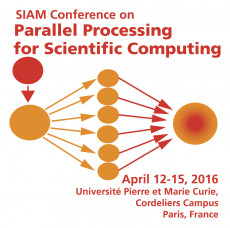Berkeley Lab Staff Contribute Papers to SIAM Conference on Parallel Computing
March 28, 2016
Every other year, hundreds of parallel computing experts convene for the Society for Industrial and Applied Mathematics (SIAM) Conference on Parallel Processing for Scientific Computing. When the seventeenth meeting in the series is held April 12-15 in Paris, France, a number of Berkeley Lab staff will contribute their expertise in papers and invited talks. The conference provides a forum for communication among the applied mathematics, computer science, and computational science and engineering communities.
The conference series has played a key role in promoting parallel scientific computing, algorithms for parallel systems and parallel numerical algorithms. The conference is unique in its emphasis on the intersection between high performance scientific computing and scalable algorithms, architectures, and software.
On Thursday, April 14, Berkeley Lab Deputy Director Horst Simon will receive the SIAM Activity Group on Supercomputing (SIAG/SC) Career Prize. Established in 2009, the prize is awarded to an outstanding senior researcher who has made broad and distinguished contributions to the field of algorithms research and development for parallel scientific and engineering computing. Simon will give a guest lecture on “Supercomputers and Superintelligence.”
Here is a list of Berkeley Lab papers in scheduled order of presentation:
Tuesday, April 12
- Mathias Jacquelin, Esmond G. Ng, Yili Zheng and Kathy Yelick co-authored a paper on “Parallel Combinatorial Algorithms in Sparse Matrix Computation?”
- Ariful Azad and Aydin Buluç co-authored a paper on “Parallel Graph Matching Algorithms Using Matrix Algebra.”
- Osni A. Marques co-authored a paper on“Coarse Grid Aggregation for Sa-Amg Method with Multiple Kernel Vectors.”
Wednesday, April 13
- Horst Simon will participate in the session “Forward-Looking Panel: Supercomputers Beyond the Exascale.”
- Xiaoye Sherry Li co-authored a paper on “Preconditioning Using Hierarchically Semi-Separable Matrices and Randomized Sampling.”
Thursday, April 14
- Ann Almgren will, as one of seven invited speakers, present on "Next Generation AMR."
- Leonid Oliker, Aydin Buluç, Rob Egan, Evangelos Georganas, Steven Hofmeyr, Daniel Rokhsar and Kathy Yelick co-authored a paper on “Extreme-Scale Genome Assembly.”
- Mark Adams co-authored a paper on “Progress in Performance Portability of the XGC Plasma Microturbulence Codes: Heterogeneous and Manycore Node Architectures.”
- David Donofrio authored a paper on “Emerging Hardware Technologies for Exascale Systems.”
- Osni A. Marques authored a paper on “Auto-Tuning for the SVD of Bidiagonals.”
Friday, April 15
- Wes Bethel authored a paper on “In Situ Processing Overview and Relevance to the HPC Community.”
- Aydin Buluç authored a paper on “The GraphBLAS Effort: Kernels, API, and Parallel Implementations.”
- Wibe A Bert. De Jong authored a paper on“Advancing Algorithms to Increase Performance of Electronic Structure Simulations on Many-Core Architectures.”
- John Shalf and David Donofrio co-authored a paper on“Helping Applications Reason about Next-Generation Architectures through Abstract Machine Models.”
- Francois-Henry Rouet, Pieter Ghysels and Xiaoye Sherry Li co-authored a paper on “A Comparison of Parallel Rank-Structured Solvers.”
- Mathias Jacquelin, Esmond G. Ng, Yili Zheng and Kathy Yelick co-authored a paper on “Scheduling Sparse Symmetric Fan-Both Cholesky Factorization.”
- François-Henry Rouet and Xiaoye Sherry Li co-authored a paper on “Algebraic and Geometric Low-Rank Approximations.”
About Berkeley Lab
Founded in 1931 on the belief that the biggest scientific challenges are best addressed by teams, Lawrence Berkeley National Laboratory and its scientists have been recognized with 16 Nobel Prizes. Today, Berkeley Lab researchers develop sustainable energy and environmental solutions, create useful new materials, advance the frontiers of computing, and probe the mysteries of life, matter, and the universe. Scientists from around the world rely on the Lab’s facilities for their own discovery science. Berkeley Lab is a multiprogram national laboratory, managed by the University of California for the U.S. Department of Energy’s Office of Science.
DOE’s Office of Science is the single largest supporter of basic research in the physical sciences in the United States, and is working to address some of the most pressing challenges of our time. For more information, please visit energy.gov/science.










